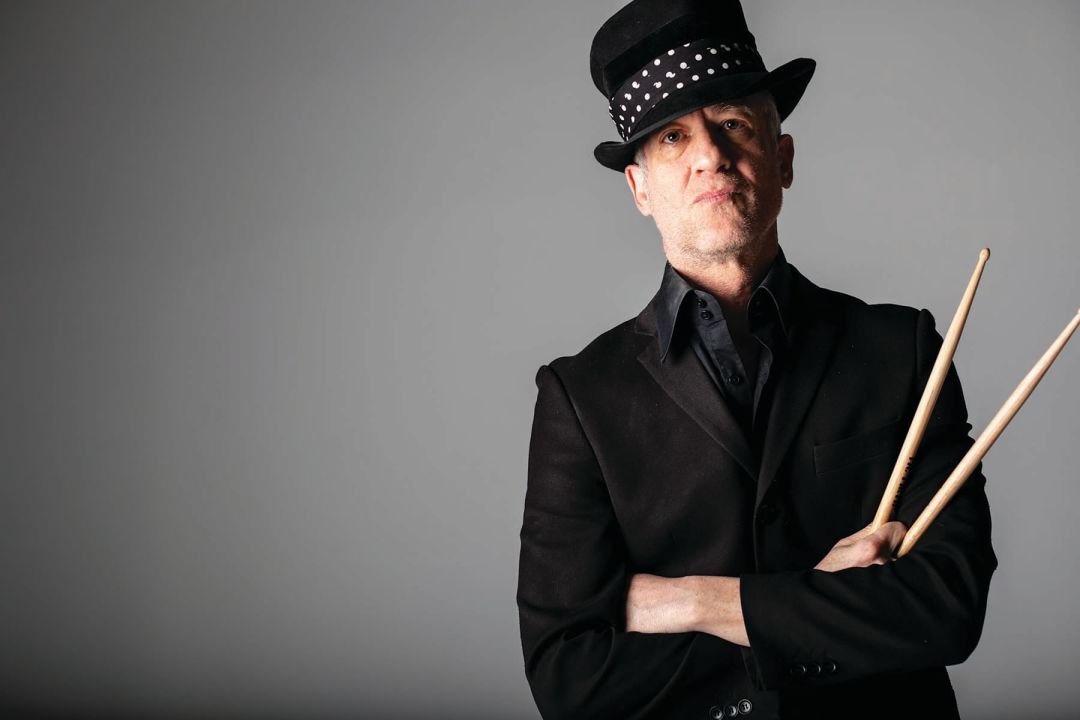Nada Surf Drummer Ira Elliot Maintains a Low Profile Despite His Rock Star Bona Fides

Image: Hannah Trombly
This year marks drummer Ira Elliot’s 30th anniversary behind the kit for indie rock mainstays Nada Surf, but he’s not defined by his day job. A longtime Sarasota visitor who moved to the area full-time in 2012, Elliot spends his off-hours from Nada Surf gigging locally with friends he’s made in the city’s music scene, playing Led Zeppelin and Eagles and Steely Dan covers at venues like Siesta Key Oyster Bar and Blasé Café & Martini Bar—gigs that are announced without fanfare and that hearken to Elliot’s bar band roots. If the bandleaders at those gigs didn’t occasionally single him out, few in the room would know that the drummer on stage once had a giant MTV hit for a band that has sold hundreds of thousands of records.
“I thought, ‘Wouldn’t it be fun to play classic rock covers and stuff I just know?’” Elliot says. “Now I get to do that all the time, and it’s improved my playing. It’s a low-impact gig, but it’s really fun.”
Elliot lives in Sarasota’s Alta Vista neighborhood in a modest-by-rock-star-standards bachelor pad. Wiry and fit, with muscular arms carved from decades of snare drum thwacks, Elliot has the look of an off-duty punk: black jeans and T-shirt, leopard-print Converse All Stars, fingernails painted sea foam green and hair jutting northward in a mohawk fade.
Though he’s is in his early 60s, Elliot exudes the enthusiasm of a striving young musician, especially when showing off Shedley Grange, the garden-shed-slash-recording-studio behind his home. (Its name nods to Headley Grange, the English workhouse where Zeppelin worked on four of its iconic albums.) With brothel-style lighting, mandala artwork, blacklight posters, a bevy of instruments and framed erotic art album covers, Shedley Grange is a tricked-out ’80s dorm room frozen in time.
“No one comes here but interviewers and friends of mine to smoke pot and listen to music,” he says. “I love it here. I treasure my privacy, and this is a nice, tucked-in place.”
Though seldom recognized on the street for his work in Nada Surf, part of Elliot wishes he were a big enough celebrity to be hounded in restaurants. “I’d like to know what that’s like for a few minutes,” he says. “I’m a natural performer. I’m more at home onstage than I am in real life. So from the time I was in my teens, I was like, ‘I’m going to be famous doing something.’ I’m not afraid of it.”
The closest Elliot came to that level of notoriety happened not long after he joined Nada Surf in 1995. Less than a year later, the band dropped “Popular,” still its most-played and best-selling single. A sardonic, partially spoken word satire on teenage relationships and the Darwinian social scene of high school, the track became an overnight sensation, even among the, well, popular set who didn’t catch its irony. Following the ubiquitous loud-quiet-loud dynamics favored by Pixies, Nirvana and Weezer, the song charted at No. 11 on the U.S. alternative charts, struck gold in France and hit No. 1 in Iceland.
After the video for “Popular” became an MTV favorite, Nada Surf upgraded its tour vehicle from a van to a bus. “We were in the eye of the hurricane,” Elliot recalls. “Suddenly we’re playing these crazy venues and people are jumping onto the stage and diving off. There were a lot of surreal moments.”
But fame can be fickle. Elektra—the label that supported “Popular” and High/Low, the debut LP that contained it—declined to release Nada Surf’s sophomore album, The Proximity Effect. Years of inactivity followed, but when the band unveiled its comeback album, Let Go, on the indie label Barsuk in 2003, the group had begun to settle into its identity as the durable, hooky and melodic indie band it remains today.
“That moment started the second phase, where we became a bona fide proper indie rock band, making our own records at our own pace. We have our own voice, and we do it the way we do it,” Elliot says. “Record after record, we try to be consistent. Our fan base has slowly moved along with us at the glacial pace with which we move.” In April, Nada Surf hit the road to continue its U.S. tour in support of its 10th LP, 2024’s Moon Mirror.
Elliot’s creativity extends beyond his main gig. When he can, he drums with Bambi Kino alongside members of Guided by Voices and Cat Power’s band. They play music from the Beatles’ embryonic period in Hamburg, Germany, when the band only played covers. Elliot also hosts a podcast, A Hard Day’s Late Night With Ira; episodes include a three-part series, “The Brown Album,” focusing on the Beatles’ weakest material.
These extracurriculars keep Elliot busy, but he also enjoys his leisure time. Despite initial reservations, he’s come around to the slower pace of living on the Gulf Coast. “Having come from Brooklyn and having grown up in New York, and holding that up as a badge, I put up a bit of a fight,” he says. “I’m too young a Jew to be retiring to Florida at this age. My parents and grandparents lived in Boca Raton; my only knowledge of Florida was Boca Raton and old people. There’s a thriving music scene here, which I had not expected. I feel quite at home.”



